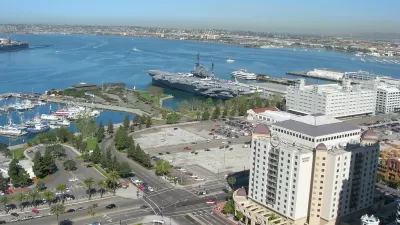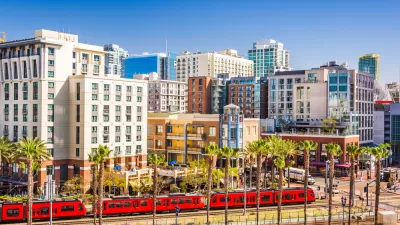Civic San Diego and San Diego planning commissioners approved new parking standards that would eliminate minimums and set maximums of one space per multifamily unit. Those reforms and more must still be approved by the City Council.

If the action by Civic San Diego, the city's entrepreneurial development partner for downtown and other neighborhoods whose directors are appointed by Mayor Kevin L. Faulconer and the city council, becomes law, expect to see less motor vehicle parking provided in future multifamily developments that should make for more affordable housing. However, a week earlier, another downtown board, composed of elected rather than appointed members, voted to oppose the new recommendations.
"The proposed parking standards, considered and approved Wednesday [Jan. 30] by Civic San Diego’s board of directors, would end minimum requirements altogether, allowing developers to build housing without any spaces if they so choose," reports Jennifer Van Grove for The San Diego Union-Tribune.
The rules would also create a new parking maximum of one space per unit for new multifamily projects. They also include a stipulation that forces what’s called “unbundled parking,” meaning that units and parking spots would have to be leased or sold separately.
The board’s recommendation comes on the heels of Mayor Kevin Faulconer’s State of the City address where he put forward a number of housing reforms, including doing away with parking restrictions.
In his Jan. 15 prepared remarks, the mayor called for "transforming San Diego into a YIMBY city." He called "the housing crisis – the number one challenge facing us today;" called for an end to building height limits in many neighborhoods and "unlimited density for developments that include affordable housing and housing for the homeless – the most generous incentive in the state."
Faulconer pulled no punches when it came to assigning blame for the city's shortage of housing, reported David Garrick for the Union-Tribune on Jan. 15.
“The bureaucracy has been set up to empower anti-housing forces that delay or deny projects at every turn,” Faulconer said during the 34-minute speech [listen here] in downtown’s Balboa Theatre.
“Obstructionists must never again be able to halt the housing that San Diego needs,” he said. “These changes represent a complete rethinking about how we deal with housing. We must change from a city that shouts ‘not in my backyard’ to one that proclaims ‘yes in my backyard.’”
The Republican mayor even did something that many Democratic local leaders haven't done by acknowledging the positive role of state government. "The state of California is quickly becoming one of our strongest partners on homelessness -- and I’d like to thank the governor and state legislature for their strong support," he said in his address.
Parking study paves way for less parking
The parking recommendations arose from "a year-long research effort to study parking demand...conducted by consultant Chen Ryan Associates on behalf of the city of San Diego and Civic," adds Van Grove.
The study recommended that multifamily developments anywhere in the city — apartments, condos or town homes — should have zero parking space requirements if they are within a half-mile of a major transit stop, or what’s known in city planning parlance as, “transit priority areas.” And, downtown, on its own, should also have a parking maximum of one spot per unit, according to the report.
Local opposition to relaxing parking standards but supported by the planning commission
A week prior to the vote by Civic San Diego, the Downtown Community Planning Council, a group of 27 elected members who represent downtown residential homeowners and tenants, commercial property owners and business people, voted "9 to 7 in opposition to the standards," observes Van Grove.
On Jan. 31, "the San Diego City Planning Commission unanimously approved [the] new rules that would eliminate parking requirements in 'transit priority areas' within a half-mile of major public transit stops," reports Joe Linton for Streetsblog California.
"Planning commissioners largely praised the proposal as a means to increase the housing supply, which experts say is key to addressing the region's affordability crisis, and also encourage residents to forgo car ownership in favor of biking, walking and riding public transit," reports Andrew Bowen.
"The matters are scheduled to be heard by the city’s Land Use and Housing committee on Feb. 6 and the full Council on March 4," adds Van Grove.
Uncertainty at the City Council
Garrick of the Union-Tribune suggests a partisan divide could present a challenge.
The [Jan. 15] speech was Faulconer’s fifth State of the City address, but the first time the Republican mayor has delivered the address while facing a 6-3 Democratic supermajority on the City Council.
That supermajority will make it harder for the mayor to pass the legislation he is proposing. Every San Diego council member lists the housing crisis and homelessness as top priorities, but they might disagree with the mayor’s proposed solutions.
Related in Planetizen:
-
A Transit-Oriented Parking Reform Proposal in San Diego, December 17, 2018
-
Since the state's 400+ redevelopment agencies were killed in 2012, cities across California have struggled to manage unfinished projects and support development in distressed neighborhoods. Civic San Diego may provide a model for life after death.
FULL STORY: Why your downtown apartment might no longer come with a parking spot

Alabama: Trump Terminates Settlements for Black Communities Harmed By Raw Sewage
Trump deemed the landmark civil rights agreement “illegal DEI and environmental justice policy.”

Study: Maui’s Plan to Convert Vacation Rentals to Long-Term Housing Could Cause Nearly $1 Billion Economic Loss
The plan would reduce visitor accommodation by 25% resulting in 1,900 jobs lost.

Planetizen Federal Action Tracker
A weekly monitor of how Trump’s orders and actions are impacting planners and planning in America.

Wind Energy on the Rise Despite Federal Policy Reversal
The Trump administration is revoking federal support for renewable energy, but demand for new projects continues unabated.

Passengers Flock to Caltrain After Electrification
The new electric trains are running faster and more reliably, leading to strong ridership growth on the Bay Area rail system.

Texas Churches Rally Behind ‘Yes in God’s Back Yard’ Legislation
Religious leaders want the state to reduce zoning regulations to streamline leasing church-owned land to housing developers.
Urban Design for Planners 1: Software Tools
This six-course series explores essential urban design concepts using open source software and equips planners with the tools they need to participate fully in the urban design process.
Planning for Universal Design
Learn the tools for implementing Universal Design in planning regulations.
Caltrans
Smith Gee Studio
Institute for Housing and Urban Development Studies (IHS)
City of Grandview
Harvard GSD Executive Education
Toledo-Lucas County Plan Commissions
Salt Lake City
NYU Wagner Graduate School of Public Service





























